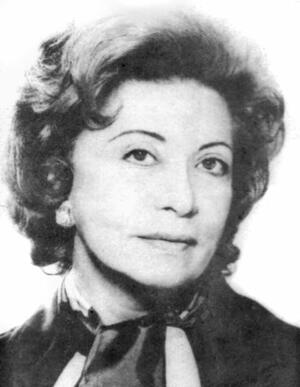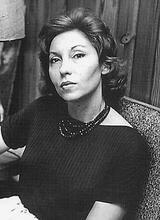Elisa Lispector
Born in Poland in 1911, Elisa Lispector immigrated to Brazil with her family in 1920. Having initially settled in Recife, the family moved to Rio de Janeiro in 1934. Lispector enrolled in a sociology course at university and upon graduating passed a demanding governmental screening process—she subsequently became a public servant in the Ministry of Labor. Lispector represented Brazil at international conferences, her main field of activity being economic security for women. In 1945 she began her writing career and over the next forty years she published seven novels and three books of short stories. Lispector’s writing was introspective and often featured solitude and unfulfilled desires as subjects. Her second novel In Exile (1948) is semi-autobiographical in its grappling with Lispector’s Jewish immigration story.
Unlike those of her renowned younger sister Clarice Lispector, Elisa Lispector’s literary works were not widely recognized during her lifetime. Nevertheless, in her forty-year career she steadily published three books of short stories and seven novels, of which the second, No Exílio (In Exile, 1948), openly conveys her Jewish origin, inheritance and allegiance to some aspects of its tradition.
Despite being the recipient of several prizes and the issuance of some of her books in two editions, Lispector lived a rather modest life, keeping away from the glare of publicity. She had a well-organized and successful career as a public servant in the Brazilian government, which gave her the opportunity to represent the country at international conferences on issues related to women’s rights in the work force.
Family & Career in Government
Born in 1911 in the small village of Sawranh in the Podolia region of Ukraine, Elisa Lispector arrived in Brazil in 1920 together with her parents, Pinkhas (1885–1940) and Marieta Lispector (1889–1930), and sisters Tânia (b. 1915) and Clarice (1920–1977). After a brief stay in the city of Maceió in the Brazilian northeastern state of Alagoas, the family moved to Recife in Pernambuco in 1925. In 1930 her mother died after a long battle with paralysis and other diseases. Although still a young woman, Elisa became a substitute mother for her two younger sisters, dividing her time between school, house chores and caring for them while their father worked. He died in 1940. Despite her encumbering duties, Elisa managed to earn a degree at Recife’s Teachers’ School and also to study music.
In 1934 the family moved to Rio de Janeiro, living for a while in São Cristóvão before moving to the district of Tijuca. Elisa was then admitted to the School of Sociology at the Faculdade Nacional de Filosofia (National University of Philosophy) and also attended courses in Art History and Criticism at the Brazilian Theater Foundation. Upon graduating from the university she applied for one of the most coveted federal posts in the country. Successfully passing the demanding and stringent screening process, she was accepted as a public servant in the Ministry of Labor. In this capacity she represented Brazil at several international conferences—after becoming a citizen. Her main field of activity was related to issues concerning social security funds for Brazilian women and for the female working force in Latin America.
Writing Career
Elisa began her career as a writer in 1945, with the novel Além da fronteira (Beyond the Frontier). The core subjects of her novels and short stories are solitude, failed human efforts at communication, introspective environments and unfulfilled desires. The apparent austerity of such topics, however, is softened by dedicated skill in the appropriate usage of the Portuguese language and a flowing poetic quality.
In 1964 Lispector was awarded both the José Lins do Rego Prize and the Coelho Neto Prize of the Brazilian Academy of Letters for the novel O Muro de pedras (The Stone Wall), which went into a second edition twelve years later. She was an active member of the PEN Club of Brazil, as well as of other major organizations.
Jewish Representation & Feminine Language
Her Jewish heritage appeared and was dwelt upon in a vivid and indelible way in the novel In Exile (1948). In this narrative, Elisa describes the contingencies and tribulations suffered by a family fleeing from Russia, and their arrival and settlement in Brazil. Not only did she mention in interviews that the novel contained autobiographical elements, but this message is clearly reflected in the details of her own family and the names selected for the characters: Pedro, the father, is the Brazilian version of Pinkhas, his real name in Yiddish; Marim is a fictional version of Marieta, her mother’s name; the characters representing her sisters were Ethel (for Clarice) and Tina (for Tânia). Sustaining a pensive and observant voice throughout the novel, Lizza (a clear derivation from the author’s own name) is the main character, repeatedly alluding to her own isolation while growing up in the midst of the family’s tribulations. The narrative begins at the point in 1948 when Lizza, as an adult woman, is released from a hospital in Rio de Janeiro. Inside the train taking her back home she hears a newspaper boy at a station stop announcing: “Read this paper! Latest news! The Jewish state has been proclaimed!” The news thrills Lizza and triggers recollections of her family’s flight from Russia and their subsequent sufferings in Europe, where they were constantly unwelcome, until they finally reached Brazil. Following the stages experienced by the Lispector family after their arrival in Brazil, the narrative relates to the disappointments suffered at their first port of arrival, where they had sought refuge among relatives already established there. This is followed by the mother’s illness, the father’s attempts to find means to provide for his family of orphans, their poverty and the little joys that would be rekindled in her memory.
A recurrent motif in the novel is birth and rebirth, used in a metaphoric or symbolic way. Elisa refers to the protagonist’s rebirth after a long disease, the birth of a new state for the Jews and the rebirth of her family in the new country. Many of the episodes described are of a clearly feminine nature—that is to say that the language refers to the protagonist’s feelings in a manner that could only be uttered by a female narrator. This is very evident when the narrator refers to the protagonist’s reaction to the paperboy’s shouts. It is imbued with a gynocentric metaphor, creating a sensation of total surrender to a feeling of lassitude that was spreading “all over her being, as if a fountain of tepid water was flowing inside her, impregnating her body to the last cell.” The same descriptive terms, with some variations, could be applied to a woman’s feelings after happy intercourse. Similar symbolic language is used in other passages in the narrative. One example is a description referring to a period during which a plowed tract of land lies fallow, when terms pertinent to gestation are employed: “in the depth of its entrails, the fruitful miracle of sap and life.”
In the novel In Exile, Elisa Lispector, one of the few feminine voices in the Jewish realm of Brazilian literature, was able to mingle her Judaic pride, feelings pertinent to women only, and a developed sense of poetry and perfectionism in the usage of the Portuguese language. The author, who never married, passed away in Rio de Janeiro on January 6, 1989.
Selected Works
Novels
Além da fronteira (Beyond the Frontier). Rio de Janeiro: José Olympio, 1945.
No Exílio (In Exile). Rio de Janeiro: Irmãos Pongetti, 1948.
Ronda solitária (Solitary Round). Rio de Janeiro: A Noite, 1954.
O muro de pedras (The Stone Wall). Rio de Janeiro: Rocco, 1964 and 1976.
O dia mais longo de Teresa (Tereza’s Longest Day). Rio de Janeiro: Record, 1965.
A última porta (The Last Door). Rio de Janeiro: Documentário, 1975.
Corpo a corpo (Hand to Hand). Rio de Janeiro: Antares, 1983.
Short Stories
Sangue no sol (Blood on The Sun), Rio de Janeiro: Brasília Ebrasa, 1970
Inventário (Inventory). Rio de Janeiro: Rocco, 1977.
O tigre de Bengala (The Bengali Tiger). Rio de Janeiro: José Olympio, 1985.
Perez, Renard. Antologia Escolar de escritores brasileiros de hoje (Present Day Brazilian Writers—A Reader). Rio de Janeiro: Ouro, 1970.
Litrento, Oliveiros. Apresentação da Literatura Brasileira (Introducing Brazilian Literature). Rio de Janeiro: 1974 and 1978.
Igel, Regina. “Os Polos da Solidão Humana: Elisa Lispector (The Poles of Human Solitude: Elisa Lispector).” O Estado de São Paulo, “Cultura” (July 7, 1985): 7.
Josef, Bella. “Preface.” In The Bengali Tiger, ix–xi. Rio de Janeiro: Olympio, 1985.




